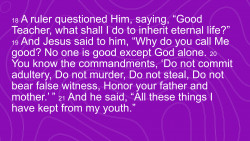The Invitation - Part 2
Sunday message.
Join Pastor Jamie for part two of The Invitation series as he delves into the true essence of discipleship, challenging everyone to move beyond mere rule-following and to genuinely follow Jesus. Discover how embracing a childlike faith and aligning our lives with Christ can transform our journey and deepen our relationship with God.
MP3 Audio
MP3 Transcript
View an A.I. generated full transcript of the audio.
Good morning, everybody. My name's Jamie. I'm the lead pastor here. And if you're new in the room or joining us online, thank you so much for being here today. As Fred's already mentioned, it's kind of a travel week.
The book ends of spring break for our county. And I'm just thankful that you chose to be here today to hang out with us. And I hope for a few moments consider something that could potentially be life changing for you. You know, I was thinking about this message and I began to think about how we have a problem, and we have a problem in America, specifically with this idea of discipleship. And we have a problem with discipleship because a lot of people, they hear that term and they're like, what in the world are you talking about?
You know, I was meeting with someone a few weeks ago and we were talking about this idea and I said, well, you know, maybe it sounds a little bit better to talk about coaching. It doesn't sound as, as kind of like foreign as the word discipleship does. You know, when you are under a coach, they're trying to help you get better, to coordinate efforts and all the things that a coach will do. And some of you may have a personal coach or maybe some of you have a mentor in your life, somebody you've invited to come alongside of you, maybe a little further ahead of you in life, and you're giving them the permission to, to speak into your life and to process life with you. Discipleship is kind of those things plus a little bit more.
See, discipleship is this idea that you and I follow Jesus. I mean, I could expand the definition of discipleship out more than that, but at the end of the day, if someone who has not been to church doesn't know anything about church, and you drop the term discipleship on them, Simply put, discipleship is following Jesus. When you study the scriptures, you find that, especially in the Gospel, that about around 40 times Jesus alluded to and a few times invited people to believe. In other words, the abstract concept of belief is more than just putting intellectual assent to some fact. Like, I believe that George Washington lived.
I've never seen him, I've never heard him. I've never been to where he's buried. I believe he existed, but I have not entrusted my life to George Washington. You're welcome.
Faith is so much more. You see, when you read the Gospels, Jesus intentionally, it's listed throughout the four Gospels, the three synoptics, Matthew, Mark, and Luke, and then in John, where Jesus invited people to follow him it was an imperative. It was a command. The first of those is found very early in. In Jesus ministry when he invites Peter, Andrew, James, and John.
And the way he actually used two different phrasings. The first phrasing that he used was, come get behind me. In other words, it really paints a picture. In this command, he says, due, come and be beside me. Right behind me.
But then there's this other phrase that he uses, and he uses it more often than the other, where he says to follow me. And the root of that word is embedded in this idea of being on a road. And in fact, I used the illustration last service. Let me use it again. It's NASCAR season, and when you go to these long tracks, there's this concept in racing called drafting.
Any of you heard that term before? It's where one car gets in line with another one, and the draft that comes off the front car, the other car kind of gets sucked into its vacuum and pulls the car along with it. Have you ever heard of that before? Now, listen, don't leave here and get on i85 and try to get up behind a tractor and trailer and think it's going to drag you down the road. I've tried that before.
You actually start bouncing. But it's the same ideal. Jesus says, I want you to follow me. Then the key note there is, he says, me. He is the position.
So on one invite, he's saying, come be behind me. And this other invite, he is literally saying, follow me. And you can take these. Because Matthew, Mark, and Luke are what we call the Synoptic Gospels because they're in sync, a lot of what you read, most of what you read in Matthew will be seen in Mark and. And will be seen in Luke.
In fact, the story we're going to read today from Luke 18:18, if you'll go ahead and turn there, is in all three of those Gospels, the Gospel of John is very unique. 90% of what you read in John is only found in the Book of John. But what's consistent is this idea that Jesus is saying, I want you not to just put intellectual assent in me. I'm asking you to follow me. And the kind of faith, the saving faith that we have is the kind of faith that will willingly get in line with Jesus.
Why would you want to be saved by somebody that you don't want to follow? Why would you want to get in line with somebody that you discount or discredit? I think of one reason. A lot of you in this room, when you were a little child Got hell scared into you, and you went to an altar because you didn't want to go to hell. But you had no, no inkling, no desire to want to have a relationship with the one who's giving you life.
It was a get out of hell free card is what you went to get. And since that moment, you really, if you're honest with me, you really haven't walked with Jesus. He's this distant being who gave me these good ideals to follow. We're going to unpack the word good in a little bit, but this is what Christianity means to you. I'm just going to be as good as I can be, and maybe God will be happy with me.
And if somebody came up and said to you, like, well, how are you secure in Jesus? How do you know that you're saved? You begin to point to all the good things that you do so you can prove to people how good a person you are. Remember last week when we talked about the Pharisee and the tax collector and both went to pray? What was it that the Pharisee began to do?
Well, I fast two days a week and I give of my tithe. He was an outstanding Pharisee. Guess who else was? Paul was an outstanding Pharisee, probably even more than the man that was in that parable. When I inflate myself, when I elevate myself, when I begin to look at other people with scorn and contempt and go, well, at least I'm a little bit better than them.
Remember last week we said we need to change our view. If I'm going to get in line with where God is leading me, I need to look at people different, starting with myself. But this week, what I want you to do is begin to ask the question, why?
Not only do you need to change your view, you need to change your volition. You need to change what makes you do what you do. You need to ask the question why? My question today isn't necessarily, are you following Jesus? I want to know how you're following Jesus.
In fact, I want you to just listen for a moment at taking those statements, those commands to follow Jesus. And I want to categorize them. There's about five or six. The first one we see it is in Matthew 4, Mark 1, Luke 5, where Jesus calls those first disciples and he says, follow me. I will make you fishers of men.
The duet apiso mu. You're impressed, aren't you? You don't even know what I said. I'm so smart. I can read.
Being smart doesn't make you a better disciple, you know that. Can I tell you something? Just because I got Dr. In front of my name doesn't mean I'm a better Christian either. I'm gonna meddle with you guys today.
But he invites them to be fishers of men. There's a purpose. But he said, come put yourself behind me. So who's in charge? Who's in the lead?
How many times as a kid you got ahead of your mom and dad, got lost cause you didn't know where you were going. And they'd be like, come get behind me. How many? Oh, please, please tell me this, how many of you, Your parents had the monkey on your back with the leash? Would anybody be willing to confess this morning?
Yep, that was me. I had the monkey, they strapped me down and I had to yank him back. This little boy over here just raised him. I did it, boy, because we need you. He needed them behind him because they wouldn't know where to go.
The the other construction which is used the majority of the time, the akule mu, it means literally get on the highway. But I'm leading, think drafting. He used it when he called Levi, when he said, follow me. And Matthew got up and followed him. He said it to Philip.
He just said, follow me, get in line, get in lane with me and go in this general. And all of this applies to all of us in the general invitation to follow him. He said, if anyone would come after me. Well, why would you want to come after him? You need to change your volition.
You have to want to get in line with Jesus. You've got to see that he's the source of life, that he is the model to follow. If anyone would come after me, he must point in time, deny himself. Point in time, take up his cross, which means you die to yourself. But then the next one is a present tense imperative.
And follow me, be following me. It's not a point in time where you go, yep, well, I signed that card. I'm good for the rest of my life to the day you leave this world. And then he goes on. And there's other little parts where Jesus talks about this idea where he even says, like, listen, follow me and leave the dead to bury the dead.
These people are giving excuses of why they can't leave. Right then, right now, there's an immediacy. Would you agree? And there's not only an immediacy to follow him, there's a sacrifice. He says, you, you know, he says, foxes don't.
They sleep out in the Fields. And I'm leaving. I don't have a bed. Are you okay to follow me if you don't have a bed? Are you willing to give up comfortability to follow me?
Well, why would you? When Jesus is the priority in your life, then you'll follow wherever he goes. And the reason we have a discipleship problem in this world today, it's because culture is teaching you to make Jesus into an idol. That he is not.
We're being called. Are you hearing me? To follow Jesus. And he is the master. He is the Lord.
But what culture's doing today, you need to be careful with what you read about Jesus online and what you see in these shows and movies, because sometimes it is a construction, a Jesus that really ain't Jesus. You remember Exodus 32? Moses is up on the mountain. You know, he's like, where did Moses go? Anybody seen Moses?
He's not around. And so they come to Aaron. This is what blows my mind. Aaron had been with Moses this entire time. Every time Moses went to Pharaoh, Aaron was with him because he was his mouthpiece.
Moses didn't want to speak because he had a speech impediment. He didn't want to speak. Aaron was the one who was a part of these miracles. And they said, you know, Aaron, Moses is gone. What are we going to do?
Well, y'all just bring me all your gold and we're going to make an idol. Like, how do you go? I'm like, that doesn't make sense to me. How you go from seeing God do all this awesome stuff and being his mouthpiece going, well, let's just make an idol. And so he makes an idol.
And if you read the text carefully, he says, get ready for tomorrow. We will have a feast to Yahweh, the calf that they made. He said, this is Yahweh.
Moses comes down off the mountain. And you remember what Aaron's excuse was in the way we read it in the English, he says, well, I threw the gold in the fire and out poof came this calf magic.
See, we're doing that. I mean, we're laughing, but a lot of us take this kind of Christianity and we put it in the fire and out spits this form of Christianity that's really more about us than it's ever about God. And that's why you're struggling as a disciple, because you have not yielded to the lordship of Jesus Christ. If you listen before Paul said to believe, he said to confess with your mouth that Jesus is the Lord and believe in your heart. That God raised him from the dead.
Faith is more than believing in a historical fact. It is entrusting your life to the hands of Almighty God. And if I don't go ahead and read this passage, we're going to be here until 3:00. So if you would stand with me. And I want to start reading.
Actually, can I back up for a few verses? It's not going to be on the screen. Pick up with me in just a minute. David, I want to read verse 16, because you've got to understand there's a context here in these stories he's about to tell. He's going to answer the question about inheriting eternal life, he says in verse 16.
But Jesus called for them, saying, permit the children to come to me and do not hinder them, for the kingdom of God belongs to such as these. Truly, I say to you, whoever does not receive the kingdom of God like a child will not enter it at all. You got that picture in your head. Childlike faith. We use that phrase and we don't know what it means.
I won't talk about that in a little bit. A ruler questioned him, saying, good Teacher, what must I do to inherit eternal life, which is to be in the kingdom of God? And Jesus said to him, why do you call me Good?
No one is good. I can stop right there for a moment. Moment. No one is good. Romans 3:23.
All have sinned and fallen short of the glory of God. No one is good except God alone. And y'all already know what. The guy's missing. He's looking at him.
Good is standing in his presence.
You know the commandments. Do not commit adultery, do not murder, do not steal, do not bear false witness, honor your father and your mother. And it's more than just knowing them. It's doing them. But you know what?
He wasn't doing them. Because he says. And he said, I've done all of these from my youth. When Jesus heard this, he said to him, one thing you still lack. Sell all that you possess and distribute it to the poor, and you will have treasure in heaven and come, follow me.
But when he had heard these things, he became very sad, for he was extremely rich. And Jesus looked at him and said, how hard is it for those who are wealthy to enter the kingdom of God, for where it's easier for a camel to go through the eye of a needle than for a rich man to enter the kingdom of God? Then they said, who can then be saved? And he said, the things that are impossible with people are Possible with God, Father, as we dig into this, challenge our volition and change our why to be in line with what your why is. In Jesus name.
Amen. That was awesome. Did y'all hear that? You know what, when you think about, I'm just gonna go off that because the other day I was walking down behind the priest, I was on the phone talking to somebody and I heard the kids outside playing on that new carpet. Have y'all seen the new carpet where the playground's gonna be moved to eventually?
I mean, it's awesome, but it will shock the snot out of you. I'm not joking. I'm not joking. I went out there and there's like eight preschool kids and they're just jumping around and their head is standing straight up and this little girl looks at me and she says, you want to bounce? And I said, yes, ma'am, I do.
So I went into bouncing, I'm bouncing with them and I reached up and touched one of those poles where they're putting in that chain link fence and I thought my arm was going to fall off. But you know, it's so simple and innocent, the childlike face, faith that he's calling us to see. You go hang out with kids sometimes and look at how they, they're not sitting there worried about where snack's going to come from. They just come and say, I'm hungry. I remember when Caroline was in preschool, Laura and I were asleep and Caroline's always been our quiet kid and we're laying in the bed at night and even at three she was afraid she would bother us, but she didn't mind scaring the snot out of us as we're laying there in bed and Laura's like, do you hear something?
I'm like, I do too. And she looks over and Caroline is standing right beside her, going sucking on her sippy cup. She didn't want to wake mama up, but she was standing there. The innocence of a child. And that's the context that we see going into this passage, that if you have a childlike faith, you can inherit the kingdom.
That's the essence. Salvation is entering the kingdom of God. But a lot of us, we think that we're going to enter the kingdom of God because we think we're pretty good people. Most of us go like, alright, well, you know, I'm a little bit better than so. And so I go to church five times and they might go three times.
So I'm doing pretty good, aren't I? Or they might say, well, you know, I know I not only tithe, I'm giving something else, or I mean, and you begin to gloat in the good things that you do because you think it's going to make you good. And I would beg or I would bet that most of us in this room, if I said, hey, you know, what do you think about yourself? Are you a good person or a bad person? You'd probably be, well, I'm a pretty good person.
And we forget the words of scripture that says our righteousness is filthy rags before God. Any goodness that you and I obtain, any goodness that we hold, did not come before from us. It is as much a work of your flesh to indulge in lust as it is for us to gloat in our flesh doing good stuff to self justify. I'm going to dig into that in just a little bit. But I want you to understand that when somebody says, are you a good person?
If I ask you that right now, are you a good person? How would you justify that? You'd begin to rattle off the list, well, I do this and I do this and I do this. How many of you, when they say, are you a good person or a bad person? Go to, no.
Jesus lives inside of me through the Holy Spirit. And because he's good, I have the potential to do good things. You see, it's the cart before the horse. When we gloat in our own works, we're no different than the Pharisee who elevated and inflated himself and tried to tell everybody in the world how good he was. I'm going to write a book, hopefully in the next decade.
No, you can laugh at that. I've been wanting to write this book for a long time. Laura knows this book. I've wanted to write this book for a long time. And the title of the book will be this, if you were any kind of Christian.
Because in our lives we'll hear people say, well, you know what? If you were any kind of Christian, you would give 20%. If you were any kind of Christian, you would read this book. If you were any kind of Christian, you would do this and do this and do this. All of those are is these little categories of trying to set people up to do good things.
Sometimes to make the person who's saying do this stuff feel better about themselves. There's only one kind of Christian, the one who is broken and spiritually bankrupt, who admits his faults and his failures or her faults and failures, that comes trembling before an almighty God and falls on their knees and prays the same thing the publican prayed last week. God have mercy on me, the sinner. That's the kind of Christian that exists in this world. You either are a saved sinner or you are a lost sinner.
And only one of those has hope for eternal life, and it does not come from their good stuff. Look with me at the text in point number one here. If I didn't give you the other one, I think it says, if you want to get in line with what God is doing, change your volition. Change your volition. And I think we need to change our attitude about where our source of goodness comes from.
Point number one. Good is knowing God. Good is knowing God. It is not about the perception of people in this world that they might have of me. And you might think that you're a pretty good person, but when a good person does something bad, that doesn't compute.
And so what you will do is try to do something good to cover up your bad. Look, this is not about balancing the scale between the bad stuff you've done and the good stuff you've done. One small little bad tips that scale all the way to the ground. There is no balance between good and bad. You and I were born in this world.
We were born sinners.
And we need Jesus to forgive us of our sins. Whether that means I stole a cookie when I was four and a half years old, before mom and dad said I could, or maybe you did commit murder. Aren't you thankful that when Jesus lays this out, he's talking about keeping rules, and he says, you've heard it said you shouldn't commit murder. But I tell you, if you've hated your brother in your heart, you've committed murder already. Or when he said, you've heard it said to not commit adultery.
But I say, if you look upon a woman and lust after you've already committed adultery, it's a heart issue and all of us stand in great need. So here's this man with need, and in his arrogance and his ego, he walks up to Jesus and says, good Teacher, what must I do to inherit eternal life? This ruler that probably was despised a little bit by other people in there, but he was like, man, I've got enough money to buy whatever I want. I'm a ruler of people. I can tell people what to go and do.
We know from other synoptics that he was considered a young man in this part of his life, and we don't know who he is. We don't know who he is. Steve Payson has some Theories, but I don't know that I'm really willing to commit that. We know who he is. Maybe he did come around.
But will you hear one thing today? He missed it. And my question to you is, will you miss it? It's not if you're following Jesus. How are you following Jesus?
So he says to him, good Teacher, what did he base the goodness of about Jesus? Because Jesus said some good stuff. Or maybe he said stuff that this rich young ruler agreed with. Or maybe he's seeing the byproduct of the healings and the teachings and he's going, well, you must be good, because good things are happening. Jesus knows his heart.
Remember back in verses before, in chapter 16, when he was reprimanding the Pharisees, he said, God knows your heart, and he knows this man's heart. And he says, well, why are you calling me good? He's questioning the adjective that this man put on his life. Jesus makes the point that there is no one that is good, that is perfectly good, wholly good, but God alone. So there's two implications in his response.
The first one is, Jesus is setting the standard of goodness. It's God himself. If you're going to say something or say that someone is good, then you at the end of the day have to say, but are you as good as God? And the answer is a resounding no. No, we are not as good as God.
Remember the Fall. Satan says, if you eat that fruit, you will know like God. And the first thing that happened when their eyes were opened is they saw their shame and they tried to cover it up.
It's ironic that it took the life of an animal to cover their shameful parts. And that's what Christianity is to a lot of people. That's what discipleship is. I just need to do some good stuff to cover all my bad parts. That's not what it's about.
Because here in this. Here's a second truth that's implied in this text. The man says that Jesus is good. And Jesus says, there's only one who is good, that's God. And so he's saying, if I'm really good, like you're saying I'm good, then you're looking at the face of Almighty God and all the good things I'm teaching.
If they're that good, are you embracing them? And that's the question for you and me today. When you think about being good, is your first response to tell everybody how good you are, or to point back to Jesus and talk about how good he is. Somebody goes like, man, that's so good of you. That's all right.
But let me tell you about who really is good. Let me tell you about Jesus Christ. Let me tell you about what he's done for me and what he can do for you. And continually put the praise back where the glory belongs. The second point here is that being good or good is more than rules.
Now, this is the part I'm going to give you just a little warning. I'm about to rattle off about five or six verses, and you're welcome to write them down. A lot of them are in Galatians. If you want my notes, I have no problem emailing them to you. But you got to email me first or text me, whichever works best for you.
Jesus knew this man's heart, and he knew what was in his heart. And he recognized right off the bat that what he's saying about his own goodness didn't line up with where this man's heart was. The law was never given as a checklist to prove personal righteousness. The Pharisee in the parable earlier in the chapter was a Pharisee of perfection, fasting, and giving. But then in 1814, it says that the one who gloats in himself would be humbled.
Aren't you glad he humbles us? When we need to be humbled, we need to pray that God would humble us. When we start taking too much account of our goodness, we need to start pointing that goodness back to who is good. But Paul says in Galatians 3:19, Galatians 3:19, that the law was given to highlight sin. It was a mirror.
In other words, the law was given so that a person could look at the law and go, man, I don't match up. I mean, it's as specific as saying, if your bull, if you owned a bull, kills somebody else's bull, then you should go and pay restitution to that man for the death of his bull. And then you get the dead carcass, so you get to back cleanup, too. You're going like, whoa, that's weird. I know it's weird.
You're telling me that this rich young ruler, he's going to say in a minute, I've kept all the commandments since I was young. He kept them perfectly. He didn't. There's no way. There's no way that this man possibly didn't look at a woman and lust after or hate his brother.
There's no way out, guys. The law was not given for you to show your Righteousness. But then he goes on in 3, 24 to say that the law is a tutor, a teacher. Or maybe we could look at it. It's like an arrow.
It's a pointer, so that we could be justified by faith, belief, entrusting our life to the one who is good. You back up into Galatians 2:16, and he says it clearly, nevertheless, knowing that a man is not justified by the works of the law, but through faith in Jesus Christ, so that we may be justified by faith in Christ and not by the works of the law. God's not taking the top 10%.
He's taking the whosoever will.
And is that you today? Because if it is. And you say, well, no, I believe in Jesus, but have you started following him? You may be saying, well, I just don't. I mean, I know I'm a bad person and I deserve hell, but he's given me this great gift.
Great. If. If he's giving you a great gift, then follow him, Follow him, get in line with him, draft with him, let him pull you along and work in your life what God intends to do. Going back to our text, he goes through those commandments, you know, the Commandments. And the man says, I've kept all these from my youth.
If you notice. If you go back to Exodus 20 or Deuteronomy 5, and you look at the commandments, the first four commandments, the way they're listed in our English Bible, deal with God, don't make idols, honor God, keep the Sabbath, that kind of stuff. The last six commandments deal with other people. So when Jesus was asked, what is the greatest commandment? He says, love God and love others.
All of the law and the prophets hinge on these two principles. This man says, I have kept these since my youth, but did he keep them for the right reason? What. What was his volition? What was his motivation?
I'll tell you what. It was to make himself look good. You see, if you are in that trap of thinking, I just need to keep a bunch of rules to make myself look good, you've missed the point. When Paul wrote in Romans 7 about the commandment of coveting, he says, I wouldn't have known I shouldn't covet unless the law said, don't covet. And then he realizes in his heart how much he's wrestling with that idea of being jealous for other people's things and how he's going back and forth and there's this war, and he cries out, o wretched man that I am, who will Save me then he says in 8:1.
For there is therefore no condemnation for those who are aware in Christ Jesus. Not keeping the rules, not checking them off. Wait a minute. Am I saying that you shouldn't keep rules? I'm not saying that.
Am I saying that there's not something to learn about following and being in line with what God has taught in Scripture? Not saying that either. It's about the cart before the horse. I want to do good things so it reflects the goodness of God and what God has deposited in my life. If my motivation is to make myself look good, I've missed the point.
That's why this is about volition. This man missed it. He said, good teacher, but there's no one that's good but God. And Jesus is God. He's the word of God.
He's standing right before this man. He's the one who gave the commandments, and yet he's standing there going, alright, well Jesus, what can I do to be saved? And he's missing it over and over again. We must learn to die to our flesh and die to this idea that we think that doing our good will cover up our bad. The only thing that takes your bad away is the blood of Jesus Christ, and it cost him his life.
Paul said that we have been released from the law, having died to that by which we were bound so that we can serve in the newness of the Spirit and, and not in the oldness of the letter point number three, because this is where the rubber meets the road. Good is knowing God. Good is not keeping the rules. But then good is following Jesus, focusing on others. All right, here he is.
You say you've kept these since your youth. All right, well, here's your test. When Jesus heard it, he said one thing you still lack. Matthew says, if you want to be perfect, because that's what this man was trying to argue. I am perfect.
There probably isn't anything else that I need to do. So, Jesus, I just need you to tell me how good I am in front of all these people. That's arrogance. He says, go sell all that you have and distribute it to the poor. If you've truly kept the part of the Commandments that's about what you do toward others, then go sell and do good for them.
And then he says, come follow me. He took both phrases due to and the word for getting on the road. He put both of those together in that one command right there. Come get behind me and then draft with me. Get in line.
I'm going this way. I want you right behind me, driving right along if you would be perfect. How is anybody perfect? Genesis 15:6, I think paints that picture. God had made a promise to Abraham to give him descendants and to give him land.
And in 156 he says this. Abraham believed God and it was credited to him as righteousness. Abraham. Guys, have y'all read Abraham's story? It's pretty bad.
Have you read David's story? Pretty bad. Moses kill somebody, bury him in the desert? Any of y'all done that lately?
You begin to trace all the disciples. Were any of them perfect? I mean, the night before Jesus died on the cross, Peter cut off Malchus ear. You think after three and a half years Peter would learn humility? Was he humble?
Not at that point, he wasn't. You can't be perfect. And you need to look in a mirror and say, I can't be perfect, but I can know the one who is perfect when I answer the call to follow after him. And so if you've lived Christianity for about 40 years and all it was was a decision that you did and you wrote your name on a card, I'm telling you today, God can release you for something great and spectacular if you will heed the call to follow after him, to deny yourself and take up your cross and follow him. What this man lacked was the right volition and the right motivation.
Is God calling you today to take a step in your faith and commit to following him. 17th century writer Robert Barclay said this. He said once someone was talking to a great scholar about a younger man and he said so and so tells me that he was one of your students. And the teacher answered devastatingly and said, well, he may have attended my lectures, but he was not one of my students. It's a big difference.
There is a world of difference between attending lectures and being a student. There's a big difference in hearing a sermon and being a follower. It is one of the supreme handicaps of the church that in the church there are so many distant followers of Jesus and so few disciples. That was 400 years ago. Do you think it's better or worse today?
God is calling you to be a follower of Jesus. Because here's the fourth point. Good is only possible when good comes from God. It's not about your righteousness. It's not about your image.
It's not about how people perceive you. It's about calling us to die to ourself, dying to what we think people think about us and living as an audience to please one. He says in verse 23. But when he heard these things, he became sad. For he's extremely rich.
He went away grieving. He had received this self inflict, afflicted wound. And Jesus used this as a teaching moment to paint the picture of how weak, how blind, how broken, stubborn, self righteous and self centered that we are. When Peter, James and John left their boats, when he said, come, follow me, when he left their boats, they didn't have to go sell those boats and give to the poor because their heart wasn't woven to their stuff like the rich young ruler was. Jesus knew his heart, in fact, by turning away.
One scholar suggests that he broke the first and the tenth commandment at that moment because he did not honor God and he actually was coveting in his own stuff because he grieved the potential loss of it. So Jesus looked at him and said, how hard? Looked at him and said, how hard is it for the wealthy to enter the kingdom of God? He didn't just say it to his disciples, he said it to that man as he was walking away. And it's almost like he gave him a second invitation.
Dude, you're wealthy, you don't need me. You don't need people. But I'm telling you, turn back around. Come this way. Don't walk away.
Come to me. Follow me. Go sell your stuff. Follow me. What is it in your life that you still have not sold in order to get in line with Jesus?
What is it that you're towing behind your car so that you can't keep up with him on the interstate? It's time to drop the trailer and, and to get rid of the stuff. It's easier for a camel to go through the eye of a needle than it is for a rich man to enter the kingdom of God. Have any of you ever handled camels before? Some of you have been to the Middle East.
You know, they're about as stubborn as donkeys. We did a nativity one time up in Helen and this veterinarian we were working with got us some camels. That was not fun. They are at. Have you ever played donkey basketball?
Have you ever heard of donkey basketball? I played donkey basketball one time. They brought 10 donkeys into a gym. Randy's looking at me like, where you going with this? And I got on the back of a donkey to play basketball.
My donkey would not move from the half court line. I'd get off and I would pull him. Listen, even if the camel was small enough to go through the eye of the needle, it would spit on you before it would go through it. And so it is with you and me if we're going to keep holding on to the stuff of this world, instead of getting in line with Jesus Christ, they looked at it and they said, well, who can be saved? And here's the promise.
Because all of this sounds impossible, right? Go back to the image. Don't forbid the kids to come to me. Because such is the kingdom of God. Who can be saved.
Saved is more than just a ticket out of hell. It is getting in align with the kingdom of God. He's inviting you into a personal relationship with him, made right by his son, so that you can walk with him. And he's given it to you, and he's given it to me. And we can't do it, guys.
We can't walk with Jesus. We can't follow Jesus on our own. We don't have the strength. We don't have the knowledge. And all of that is an impossibility.
But what did he say in here with God? All things possible. And so the disciples were like, well, wait a minute. We left our homes to follow you. We left everything to follow you.
And he says, truly, I say to you, there's not one who has left his house, his wife, his brothers, his parents, his children for the sake of the kingdom of God, who will not receive many times as much at this time and in the age to come, eternal life. Whatever you sacrifice for God, can I tell you right now, you will see it again. He said he would reward you. And it may be hard. You may think, well, I can't do without this.
Yeah, you can. It's worth it. It's worth it. When you walk into the portals of heaven and Jesus first of all says, well done. But then you enter into the glories that he's preparing for.
You and me, even now, y'all remember the. The hymn. I have decided to follow Jesus. Y'all know where that came from.
Let me give you those blanks. So I don't want you to think, oh, I didn't finish the blanks. My volition changes for good when following Jesus becomes my goal, not following rules. And the invitation is to come follow with me. I'm gonna give you that at the invitation, but I want you to hear the story because.
Not sure. Even historians say we're not sure if this is where the story of this hymn comes from. It wasn't put into ink in America until the mid-1900s, but it originated out of India. And that is true. The hymn comes out of the country of India.
There's a guy by the name of. I'll just call it by his abbreviation because that's what it's on his book. He wrote a book called why God, why? By PP Job. The.
That does not roll off the tongue. But if I tried to pronounce his Indian name, it would sound like I'm speaking in tongues. And so he writes in here about the history behind this song.
And in a village in India, there was a man who encountered a missionary, and he became a Christian.
Suddenly, the village finds out about it, and it gets to the chief. And the chief calls him in. He calls all the villagers together, and he calls his family and tells them to renounce this or to face execution. Moved by the Holy Spirit, the man sung his reply as PP Is writing this in his book. And he said, I have decided to follow Jesus.
No turning back. Knowing that it could mean his death. Makes that song a little different, does it? But it doesn't stop there. Enraged by the refusal of the man, the chief ordered that his archers arrow down his two children.
As both boys lay twitching on the floor, the chief asks, will you deny your faith? You have lost your children. You're about to lose your wife too. And the man replied again, singing, though none go with me, still I will follow. No turning back.
The chief was beside himself with fury, and he ordered his wife to be arrowed down. In a moment, she joined her two children in death. Now, he asked for the last time, I will give you one more opportunity to deny your faith and live in the face of death. The man sang this, the cross before me, the world behind me. And he was shot dead and joined his family.
That's harsh, isn't it? I think we're like the readers of the Book of Hebrews. None of us have shed blood for our faith. But when we stand up and sing a song like this, and we think it feels good. In squishing our Americanized culture, whether this story is a fable or whether it's true, it still paints the picture.
Are you pointed to a destination where no matter what comes up in your life, no matter what may come against you, no matter how hard it may get, I am going to follow Jesus Christ. He goes on to write in his book. But with the deaths, a miracle took place. The chief who had ordered the killings was moved by the faith of this man. In spontaneous confession of faith, he declared, well, then, I will belong to Jesus.
Jesus too. When the crowd heard this from the mouth of their chief, the whole village accepted Jesus Christ as their savior and their Lord. What about you today? Are you like the man wrote 400 years ago? Are you a distant follower of Jesus or are you a close companion?
How close are you to Jesus? Again, the question is not if you're following Jesus. My question today is how are you following Jesus? So I want to invite you to stand with me and I'm going to give you I told you for the next three weeks of this series, each week we're going to have a prayer point. And that's the challenge today, is that you be willing to pray.
Whether you pray where you are, whether you come to this altar, church, I want to remind you no one ever comes to this altar alone. So whatever needs you may bring up there. There's no judgment. We want you to be able to come and let church love on you. But here's the first prompt I want to challenge you to today.
How are you following Jesus? What has God spoken to your heart today to say, you know what, this is in my life. I need to cut it out. I need to be all in. I don't want to be a distant follower.
I need to take a step in my faith. And you know what that means. That may mean that you need a group. We believe key to our strategy at Ebenezer to making disciples is group ministry. Whether that's a life group, a grow group, a Wednesday night group, soon to come micro group, whatever that looks like.
You need people in your life. God didn't intend for you to walk faith by yourself. You need people and because of that, there may be somebody in your life who needs a group. We've given these invite cards out and challenged you to invite people to come to an event. And this week we're challenging to think, how can I invite somebody to come follow Jesus with me in a group?
Maybe it's somebody you've been praying for for a long time. Maybe it's somebody God laid on your heart. This week. Whatever it is, if you come to this altar, you're saying, God, I want to come up here. I'm going to lay something down because I'm tired of being a distant follower.
I'm going to recommit my life to you and I'm going to pursue you with everything I have. But maybe you need to come up here and say, you know what, I'm praying for my co worker. I know they need Jesus. I know they need church. God, give me opportunity, give, give me favor to invite them.
Father, I pray. As we stand here and reflect and we're inviting people to come and pray, I know We've got men down here. We've got ladies in the congregation that'll come pray with whoever. God, we just need you. So, Lord, touch our hearts today.
Whatever we need to lay at your feet for you to take away. Lord, I preach my guts out saying we're not doing this so that we can be seen as good people. We're doing it because you're good and you want to do good through us. So we surrender our lives, we take up that cross, we deny ourselves and we follow after you. Lord, speak to us now.
In Jesus name, amen.
Weekly Bulletin








